
Lady Luitgarde tiptoed into her sister’s room. Hetty wasn’t in it, but neither did she want to be discovered there, given the sensitive nature of her mission.
It was bad enough that she had left her own Psalter behind in her excitement over their visit – although, she wondered, what could one expect? She hadn’t left her castle since her baby was too big inside of her to allow her to ride!
But that wasn’t the worst of it. Her graver crime was that she had spent the previous evening shut up with Sophie in her room: gossiping, eating candy, and practicing a new dance – all activities strictly forbidden in this time of Advent. But what could one expect? Alred and her husband had gone out, and at Nothelm she was finally close enough to her friend that she could make a short trot out to Sophie’s house and be home again before Egelric returned.
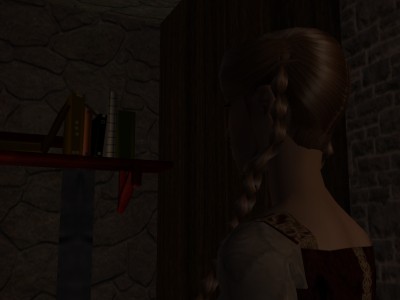
Her sister, on the other hand, had remained at the castle, studying over the readings for Mass the following day. This is what Luitgarde should have been doing all the while, but what could one expect? She had forgotten her Psalter, and asking to borrow one would have meant admitting it. She had been quite obliged to wait until morning.
Fortunately she read quickly. Lili’s interests were not confined to gossip and games, and so she was determined to get to the heart of the day’s readings and come up with something interesting to say about them…
For Father Aelfden was coming for dinner! Aelfden of Lund, who had written On the Seen and the Unseen, which their German abbess had suspected heretical and had sent out to be burned, and which young Luitgarde and young Hedwige had purloined therefore. How they had puzzled over its mysteries, and wondered over its author! They had imagined him some gnarled old prelate with a knobby nose and a thatch of grizzled hair, such as their own abbot.
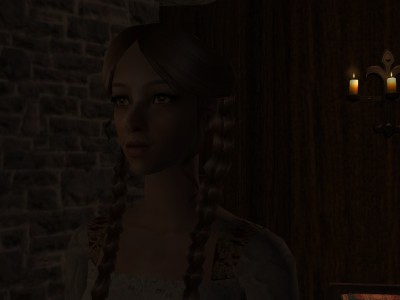
It was probably just as well the truth had not been revealed to Lili before her marriage, for she had found the priest to be young and handsome in a gaunt, terrifying, fascinating way. He had eyes that saw straight through to one’s sin, it seemed to her, and so she hoped to at least smooth a layer of devout thoughts over the candy and dancing of the night before.
Also, she did not intend to sound like an idiot before Aelfden of Lund if he asked her a question about the day’s readings. Better that he see right through to her pride and vanity than that he think her merely stupid.

Hetty’s Psalter lay on the desk in the corner, and Lili picked it up and began searching for the text at once. But as she flipped through the pages, to her horror one of the leaves seemed to loosen and fall to the floor.
It was only when she picked it up and brought it into the light again that she saw that it was not one of the age-browned pages of the old book, but translucent and glowing like the finest new parchment, and nor was it a folio, but folded neatly into thirds. Intrigued, she put the book on the desk and carried the single sheet over to where the light was better.
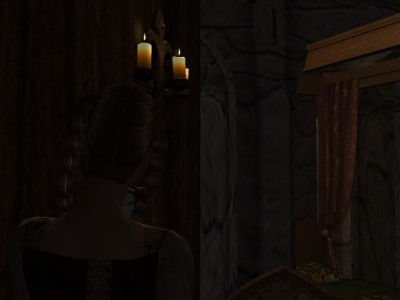
Although she had only read it once, Lili had a good memory for poetry, and this one had particular meaning for her. She also recognized the beautiful handwriting, the long flourishes on the R’s, the even lines. This was almost certainly the poem Alred had written for her – and if it was not, then he had reused entire lines of it to write a poem for her sister.

However, she was almost certain it was the very same poem, and even the very same sheet of parchment. He had merely taken it back from her and given it to her sister some time later. Did the words mean so little to him that they could be applied to any woman? Did his love? Was it all merely a flirtatious game to him? Had he laughed to see her so moved?
Did he laugh at her poor sister, who had not even the spirit to stand up to a man who treated her ill? Lili had Egelric, but poor Hetty had no better place to lay her love than in this flattering hypocrite.
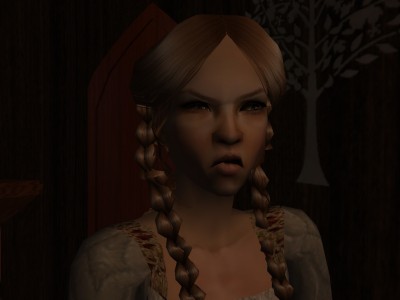
Lili was furious. So deeply she had been touched by Alred, by his poem, by his tragedy: so deep was her anger now.
Lili was furious for Hetty’s sake: she seemed to have believed him since she had kept his poem, and she would soon be gravely hurt.
And though she lacked the deep-seeing eyes of Aelfden of Lund to know it, it may have been that Lili’s own vanity and pride were hurt as well.
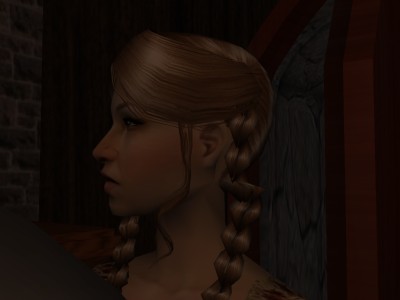





Uh oh. Why does Alred always seem to be caught up in the middle of every misunderstanding? or is it a misunderstanding? Hmm...